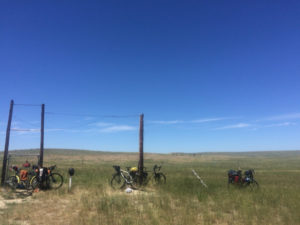 I’ve been stuffed full of new information in the last few days. New terms, acronyms, concepts, as well as new people, places, and a new activity: bike touring. It’s a good kind of stuffed, though, and I’m excited for more. Here’s a bit about two of the things that have stuck with me the most so far:
I’ve been stuffed full of new information in the last few days. New terms, acronyms, concepts, as well as new people, places, and a new activity: bike touring. It’s a good kind of stuffed, though, and I’m excited for more. Here’s a bit about two of the things that have stuck with me the most so far:
Montana is “where the rubber hits the road” in terms of coal reserves.
Fitting isn’t it, that we’re biking across the state where the rubber hits the road? My eyes have been opened up to the scale and importance of the issues we’re learning about. One quarter of U.S. coal is under Montana, with a bunch of the rest of it spread across the border into Wyoming. Other things I didn’t know: The coal here burns a lot less “dirty” (more efficiently) than the coal of Appalachia. And, the reserves of Montana are largely owned by the government. I also learned that “Colstrip” is not just a coal-strip, but a town that that is home to a mine-mouth power plant. We didn’t visit Colstrip, but its future is a topic on the minds of so many we visit with. Colstrip is the 8th largest emitter of greenhouse gas in the Unites States. Contributing to that pollution is the leaking of the coal ash/waste ponds, which have been leaking 300 gallons per minute of toxic “water” under Colstrip for 22 years. This is expected to be a big issue as coal plants are decommissioned. Organizers Mike Scott and Alexis Bonogofsky, who hosted us for three nights, are trying to make sure Colstrip is cleaned up by its several owners and not by taxpayers. Brings me back to the class I took this spring about the nexus of energy, economics, and the environment, where my professor would remind us nearly every class: “There is no free lunch.”
Sometimes things tilt in the universe. Don’t give up.
Teresa Erickson, director of the Northern Plains Resource Council, based in Billings, Montana, has spent 30 years fighting for what she believes in. It wasn’t until recently that things started going her way. Along with hard work by her and her colleagues, Erickson attributed the decrease in coal demand to “something tilt[ing] in the universe.” I liked that saying, and in the future I expect to ascribe things in my life being due to the “tilting of the universe.” It could be a positive or negative tilt, I guess.
Northern Plains Resource Council is now celebrating their win in the battle against the proposed Tongue River Railroad and Otter Creek coal mine it would have served. Several times Erickson referenced the lack of attention her region of the country gets in regards to their well-being while located in a coal-heavy area: “No one gives a sh*t about eastern Montana,” she said bluntly.
In talking with Erickson it was clear how interconnected her passion and her job are. Near the end of our meeting, she described some of the lessons she’s learned over her time as a community organizer. A few of them didn’t come as a surprise: “Justice doesn’t come from doing nothing.” “Being positive or negative is contagious.” “Hope is not a strategy.” Others, however, were almost shocking to me. She is not quite a believer in the “there is good in everyone” mantra. Instead, she said it’s okay to have enemies, seek power, and to make sure to claim credit when it’s due. I didn’t know what to think. Initially, I was thrown off by these ideas, but remind myself now that these are strategies for activism, and I’m left very impressed and inspired by her well-earned confidence and insight.
I can’t wait to see the places this course will take us over the next 20 days.
One Reply to “Claire Longcope: Where the Rubber (Literally) Hits the Road”
Comments are closed.
Nice…